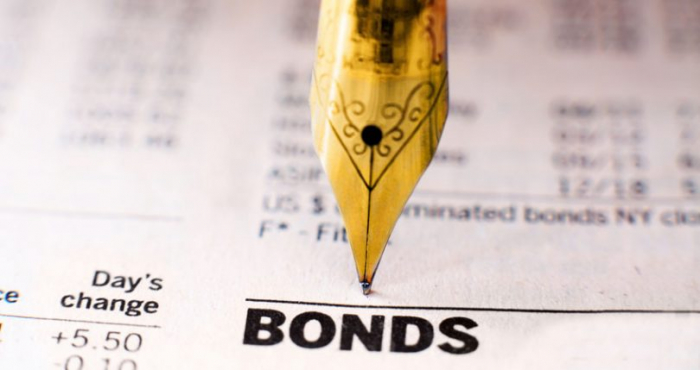Markets
Sell Korea intensifies as foreigners dump bonds for 1st time in 18 months
Steady foreign selling of Korean bonds and stocks is battering the local currency, already Asia’s worst performer
By Jul 11, 2022 (Gmt+09:00)
3
Min read
Most Read
LG Chem to sell water filter business to Glenwood PE for $692 million


Kyobo Life poised to buy Japan’s SBI Group-owned savings bank


KT&G eyes overseas M&A after rejecting activist fund's offer


StockX in merger talks with Naver’s online reseller Kream


Mirae Asset to be named Korea Post’s core real estate fund operator



A selloff in risk assets in South Korea is intensifying as foreigners turned net sellers of Korean bonds for the first time in 18 months in June while continuing to sell their stocks for a sixth straight month.
A possible 50-basis-point rate hike by the Bank of Korea this Wednesday – the central bank’s first-ever big-step move if realized – and the US Fed’s widely expected second giant-step rate hike of 75 bps in coming weeks will likely add fuel to foreigners’ flight to safe-haven assets in the US, analysts said.
According to the Financial Supervisory Service (FSS) on Monday, foreigners sold or redeemed their bond holdings worth a net 934 billion won ($717 million) on the Korea Exchange in June.
Data showed that they bought 10.543 trillion won in Korean bonds while they sold or redeemed matured debt worth 11.477 trillion won.
The June transaction marks the first time that foreign investors have turned into net sellers of bonds in Korea – Asia’s fourth-largest economy – since December 2020.
Investors from the US and Asia cashed out of listed Korean bonds worth 800 billion won and 600 billion won, respectively, in June. In contrast, those from Europe and the Middle East respectively bought a net 500 billion won and 400 billion won in bonds.

Asian investors were the largest Korean bond buyers with their holdings at 102.4 trillion won, or 44.7% of the total foreign debt investment, as of June, followed by European investors, who held 72.9 trillion won worth, or 31.9%.
By the type of bonds, foreigners bought a net 200 billion won in treasuries or government bonds but sold a net 1 trillion won in monetary stabilization bonds (MSBs).
Foreigners sold as much as 5.9 trillion won in shorter-dated debt with a maturity of less than a year, an indication that they expect further and imminent monetary tightening by the BOK and the US Fed.
However, they bought a net 2.8 trillion won in debt with a maturity ranging from a year and less than five years, and purchased a net 2.2 trillion won of five-year or longer-term bonds.
SIX-MONTH SELLING STREAK IN STOCK MARKET
On the Korean stock market, one of Asia’s worst performers this year, offshore investors are already heavy sellers, sending the main Kospi index to the lowest level in 20 months last week.
The FSS data showed foreigners sold a net 3.873 trillion won in domestic shares on the Kospi and the junior Kosdaq markets in June, extending their selling streak to the sixth straight month.

They unloaded 3.701 trillion won in shares on the Kospi market and 172 billion in shares on the tech-heavy Kosdaq market.
Europeans were the top sellers of Korean stocks amounting to 3.5 trillion won. Investors from Asia and the US sold a net 200 billion won and 100 billion won of shares, respectively.
As of June, US investors were the largest holders of local shares worth 243.5 trillion won or 41% of the entire foreign holdings, followed by Europeans (178.6 trillion won), Asians (82 trillion won) and Middle Eastern investors (19.7 trillion won).
Overall, foreigners held a combined 593.7 trillion won in Korean shares, accounting for 26.4% of Korea’s total market capitalization, at the end of June.
Their bond holdings stood at 228.9 trillion won or 9.9% of all bonds listed on the Korean market.
KOREAN WON, WORST ASIAN PERFORMER
Foreigners’ heavy selling of Korean stocks and bonds has battered the already weak local currency.
Last week, the Korean won fell to a 13-year low against the greenback, sinking below the psychologically important 1,300 per dollar level for the first time since the 2008-2009 global financial crisis.
Market analysts expect the won to depreciate further in coming months.
The local unit is the worst-performing emerging Asian currency so far this year with a 9.6% loss against the US currency.
Write to Jae-Yeon Ko at yeon@hankyung.com
In-Soo Nam edited this article.
More to Read
-
 MarketsKorean won forecast to weaken further after hitting 13-year low
MarketsKorean won forecast to weaken further after hitting 13-year lowJul 07, 2022 (Gmt+09:00)
2 Min read -
 Korean stock marketS.Korea stocks see dead cat bounce; outlook remains gloomy
Korean stock marketS.Korea stocks see dead cat bounce; outlook remains gloomyJun 24, 2022 (Gmt+09:00)
2 Min read -
 Korean stock marketForeign ownership of S.Korean stocks at 13-year low
Korean stock marketForeign ownership of S.Korean stocks at 13-year lowJun 21, 2022 (Gmt+09:00)
3 Min read -
 EconomyWeakening won: A double-edged sword for the Korean economy
EconomyWeakening won: A double-edged sword for the Korean economyMay 15, 2022 (Gmt+09:00)
4 Min read
Comment 0
LOG IN


